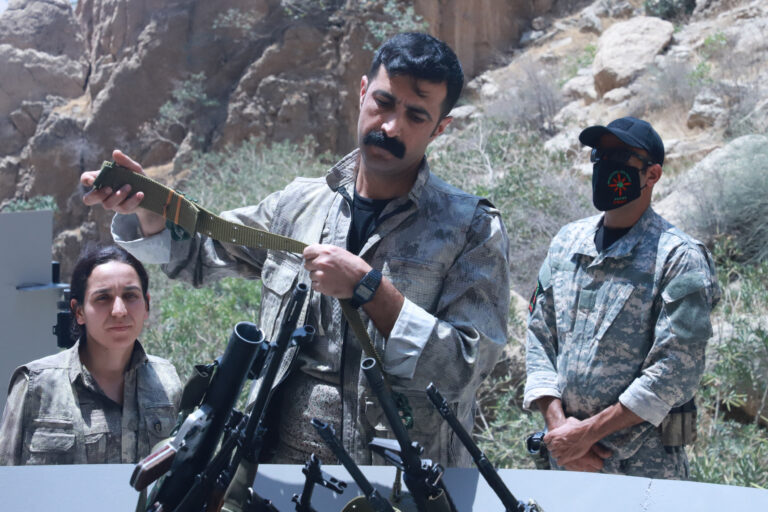At the entrance to a cave northwest of Sulaymaniyah in Iraq’s Kurdistan Region, PKK fighters threw their weapons into a fire in a ceremony that marked the end of their decades-long armed struggle against the Turkish state. The symbolic act followed the group’s public announcement of disarmament and was attended by representatives of most Kurdish factions.
Since 1984, the PKK (Kurdistan Workers’ Party) has waged an insurgency against the Turkish state that has cost over 40,000 lives and transformed borderlands into militarized zones. Now, with incarcerated PKK leader Abdullah Öcalan’s blessing—and a surprising political overture from Turkey’s far right—the PKK has unilaterally moved to disarm. Last October, Devlet Bahçeli, leader of the far right Nationalist Movement Party (MHP) and a close ally of Turkish President Recep Tayyip Erdoğan, stunned observers by suggesting in Parliament that Öcalan could be considered for parole if he formally renounced violence and dismantled the PKK.
SHWAN MOHAMMED/AFP via Getty Images
Iraq was a significant behind-the-scenes mediator and its involvement may prove decisive in determining whether this will bring a permanent end to a decades-long conflict. Concerns center on interference from remaining factions unimpressed by the terms, or by regional spoilers. For now, however, arrangements seem to be holding as all sides work to reach a final agreement.
Iraqi Mediation
The move was welcomed in Iraq, where Turkish cross-border operations against the PKK had long provoked public anger in a country fiercely protective of its sovereignty and deeply resentful of foreign incursions. With the PKK now signaling demobilization, Baghdad sees an opportunity to reassert authority in the north, ease regional tensions, and reestablish security—especially with elections in November, where the government is eager to project stability and assertiveness.
A statement issued by Iraq’s President Abdul Latif Rashid on the PKK’s disarmament called it “an important and historic step toward ending decades of armed conflict and repeated security violations that have cost countless civilian lives,” adding that it “paves the way for a more stable and secure future, strengthening the prospects for peace and constructive cooperation across the region.”
In recent weeks, Turkish delegations have held consultations with President Rashid and other Iraqi officials to ensure his close involvement in the process, aiming to coordinate with all key stakeholders in Iraq, including both Kurdish and Iraqi intelligence services, as well as political and tribal factions, during what is seen as a critical three-to-four month window.
The stakes are high. As one senior Turkish official put it: “If anything happens in this window—anything—it can derail everything.”
Not the First Time
Across the board there is palpable—if guarded—optimism that the process will not be interrupted. This isn’t the first time the PKK has declared a ceasefire. A similar peace deal was announced in 2013, but collapsed in 2015 amid renewed violence and a surge in Turkish ultranationalism.
What distinguishes this attempt, however, is how it has been framed both to PKK cadres and to the broader public, not as a surrender, but as a negotiated agreement. While the terms of the deal have not been made public, the deal calls for a mutual transition rather than unilateral capitulation.
But for some, the opacity surrounding the process is cause for alarm. There’s no roadmap, no amnesty law, and no clarity on what Öcalan may have been promised. That ambiguity feeds both hope and skepticism.
Still, Erdoğan’s speech following the PKK’s symbolic disarmament ceremony surprised even skeptical Kurds, as it appeared to embrace the vision of Kurds as equal partners within the Turkish state, reviving the kind of grand, unifying narrative that has long been absent from Turkish politics.
“When we—Turks, Kurds and Arabs—formed an alliance, the thunder of our horses brought cool breezes from the Chinese Sea to the Adriatic,” Erdoğan said to AK Party members. “Remember … from the galloping of our horses, peace spread across the lands.”
The Hard Work of Peace
With clear political reforms insofar as language rights, cultural protections, and inclusive political representation, disarmament has the potential to be transformative rather than merely symbolic.
Whether Iraq can seize this moment to reaffirm its sovereignty, strengthen internal cohesion, and burnish its credentials as a credible mediator will determine if it can step beyond the role of a battleground for others’ conflicts and emerge as a stabilizing force in the region’s long and difficult path to peace.
The PKK disarmament, despite the risks, is one of the few bright spots in today’s Middle East. From Tehran to Tel Aviv, the region is encountering greater instability than ever before. Between Israel’s bombing of Gaza, Syria, and Iran, and the ongoing humanitarian disasters in both Gaza and Yemen, it is hard to find any evidence of promise. While it may be too early to rule out interference by some minor groups, the PKK-Turkey agreement may be the one glimmer of hope in the region. It will remain incumbent upon Turkey, the PKK, and Iraq to remain committed to the just and peaceful ending of the 40-year conflict.
Tanya Goudsouzian is a Canadian journalist based in Baghdad. She has covered the Middle East and Afghanistan since 2000.
The views expressed in this article are the writer’s own.

